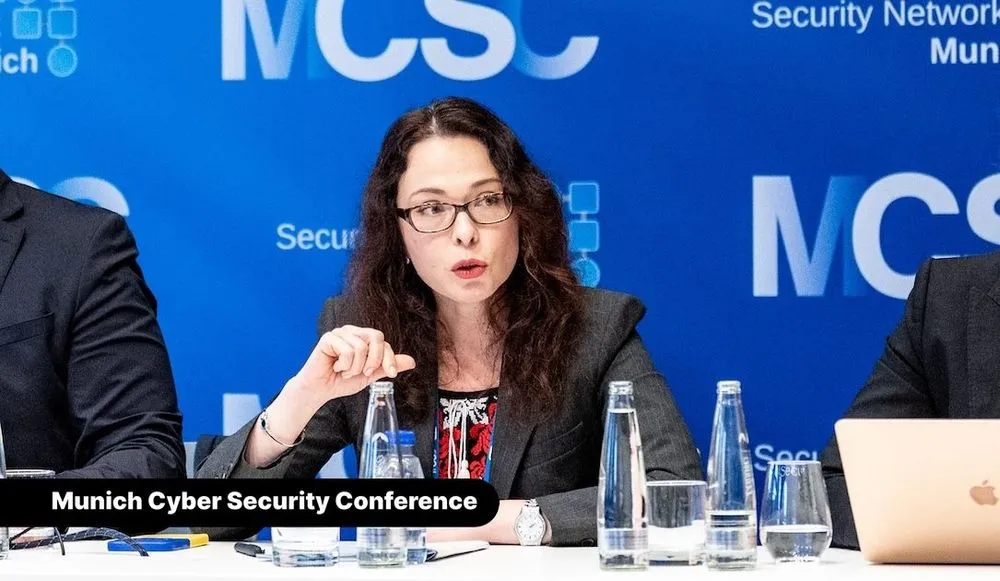Ukraine struggles to counter Russian disinfo without US support, local cyber official says
MUNICH, Germany — The U.S. foreign aid freeze and a “dramatic” shift in the Trump administration’s approach to countering disinformation are leaving European nations increasingly vulnerable to Russian influence operations, a Ukrainian security official says.
American funding has been instrumental in supporting Ukraine’s cybersecurity and counter-disinformation initiatives, said Natalia Tkachuk, head of cyber and information security at Ukraine’s National Security and Defense Council.
“This is a very serious issue for Ukraine,” Tkachuk told Recorded Future News on the sidelines of the Munich Cyber Security Conference (MCSC) on Thursday. “We hope that American funding will be restored, perhaps through alternative mechanisms.”
Soon after taking office in January, President Donald Trump froze billions of dollars in aid projects worldwide, a decision that opponents are fighting in court. International programs backed by American agencies such as USAID have been halted, posing a “significant threat” to the work of independent media and fact-checking organizations, Tkachuk said.
It’s unclear how much the U.S. has earmarked for counter-disinformation programs in its billions of dollars of aid to Ukraine. The Biden administration announced a program a few months after the Russian invasion in 2022. A review sent to Congress in 2024 said USAID’s recent emphasis had shifted to “physical and digital security resources for outlets under threat.”
The impact of new U.S. policies extends beyond Ukraine, leaving some European nations without sufficient resources to counter Russian disinformation, Tkachuk said. She cited Romania’s recent election as an example, where suspected Kremlin-backed influence operations allegedly contributed to the victory of a far-right candidate, prompting a court to annul the results.
While Russia’s influence campaign in Romania was largely conducted via TikTok, the Kremlin faces no obstacles in shifting to other platforms, including those based in the U.S., Tkachuk added.
In recent years, platforms such as Facebook and X (formerly Twitter) have taken steps to detect and limit disinformation campaigns, inauthentic behavior, and Russian-linked troll farms. However, as big tech companies attempt to realign their policies with the Trump administration, these efforts could come to an end, Tkachuk warned.
In January, Facebook and Instagram owner Meta announced changes to its content moderation policies, replacing third-party fact-checkers with a “community notes” system that allows users to determine the accuracy of content.
Meta founder Mark Zuckerberg framed the changes as a return to the company’s commitment to free expression. Tkachuk, however, warned that the move poses a serious risk, potentially increasing Russian influence operations in both Europe and Ukraine.
Russia is already waging cyberwar against Western nations, Tkachuk said. However, unlike in Ukraine — where Moscow uses digital tactics to gain military advantages — in Europe, its focus is less on direct disruption and more on information warfare.
“The goal is to undermine public trust, create a sense of insecurity, and sway elections in favor of pro-Russian politicians,” she added. Researchers at Recorded Future — the parent company of The Record — reported on Russian information operations in Germany on Thursday. Elsewhere at the MCSC, a Taiwanese official said the nation is using AI to battle disinformation on social media.
Ukraine has so far had no direct contact with the new U.S. administration regarding the shift in policy, Tkachuk said. However, Kyiv remains hopeful that communication channels will be established, given that cybersecurity threats remain a shared concern.
“The U.S. remains one of Ukraine’s key and largest partners,” Tkachuk said. “Without American support, it will be extremely difficult to counter these threats.”
READ MORE: Munich Cyber Security Conference 2025 Live Updates
Daryna Antoniuk
is a reporter for Recorded Future News based in Ukraine. She writes about cybersecurity startups, cyberattacks in Eastern Europe and the state of the cyberwar between Ukraine and Russia. She previously was a tech reporter for Forbes Ukraine. Her work has also been published at Sifted, The Kyiv Independent and The Kyiv Post.



